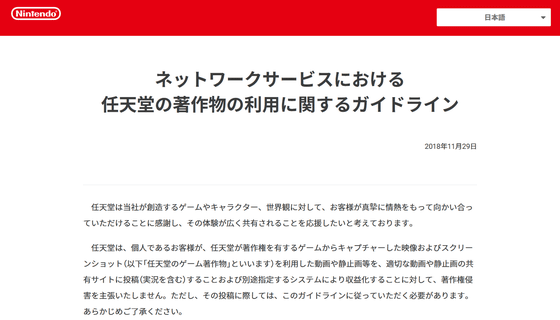Should game commentators pay a 'usage fee' to game developers?

'Let's play', which distributes how to play games, is one of the most popular video genres in the world, and in recent years, the number of people who are engaged in game play is increasing. Regarding such a game commentary, a game developer has expressed an opinion that 'the game commentary distributor should pay the license fee ', and it is causing a big ripple.
Should streamers pay game developers to stream their games? | PC Gamer
https://www.pcgamer.com/do-streamers-owe-game-developers-money/
Stadia creative director says streamers should pay publishers --9to5Google
https://9to5google.com/2020/10/22/gamers-condemn-stadia-creative-director-streamers-should-pay-publishers/
Alex Hutchinson, creative director of Google Stadia's game development company Typhoon Studios , expressed this opinion. Hutchinson said in his Twitter account, 'Distributors who are worried that content will be withdrawn by posting music that they have not paid for distribution will also pay usage fees for the games they are using for distribution. You should be aware that you are not paying. '' Game broadcasters should buy licenses and pay content usage fees to game developers and publishers, just like any other business. ' At that point, it received so much attention that it received 18,000 retweets and retweets.
The real truth is the streamers should be paying the developers and publishers of the games they stream. They should be buying a license like any real business and paying for the content they use.
— Alex Hutchinson (@BangBangClick) October 22, 2020
As Mr. Hutchinson pointed out, for example, Twitch, a service specializing in live music, is working to protect intellectual property rights related to music, and distribution and uploading content including copyrighted music is a violation of the rules is. Similarly, under copyright law, there is no legal authority to distribute video games developed by others without a written license agreement.
Playing games for hours to entertain viewers is outside the scope of fair use , but many game developers and publishers think that the benefits of being delivered are greater. Therefore, we allow game distribution. In one example, Blizzard has a policy of 'no problem as long as you don't charge a viewing fee,' and Nintendo states that 'as long as you follow the guidelines, you won't claim piracy.'
Guidelines for Using Nintendo's Copyrighted Works in Network Services | Nintendo
https://www.nintendo.co.jp/networkservice_guideline/ja/index.html

On the other hand, games that emphasize scenarios, such as novel games, lead to 'spoilers', so it is disadvantageous to be distributed. If such a game has been distributed, the developer can submit a deletion request 'after distribution', and it is impossible to stop the distribution itself. On top of that, there is concern that submitting a deletion request will damage the reputation of distributors and viewers.
Ryan Green, who developed the 3D adventure game ' That Dragon, Cancer, ' claims to have actually suffered these disadvantages. 'That Dragon, Cancer' is based on Grene's own experience that his son was diagnosed with a rare type of invasive cancer shortly after his first birthday, 'a young son with cancer.' It is a title that depicts 'and the life of the family'. When we announced the demo version at the Game Expo, the people who played it couldn't stand it and started crying, which was highly evaluated in terms of the story.
That Dragon, Cancer --Official Release Trailer --YouTube
According to Green, there were millions of viewers who watched the live movie of 'That Dragon, Cancer,' but it didn't generate any sales. 'Although it violates the copyright of the developers, the live game is useful for fighting games and sandbox games, but it's short and relatively straightforward, like That Dragon, Cancer.' In the case of the game, millions of viewers were satisfied with the movie alone and didn't enjoy the game in the personal way we intended. '
Regarding this situation, PC Gamer, a game news site, said, 'Even if there is no live movie, the sales for viewers will not increase, but there are millions of people who have seen their games. It would be difficult to blame Mr. Green for experiencing a situation where few people actually bought and played it. ' However, on the other hand, if the game distribution is charged, 'only the big distributors who are getting enough profit from the game distribution can pay the fee', pointing out that there is a barrier to entry for new distributors. He expressed concern that it would be formed.
Regarding Hutchinson's remarks that aroused this discussion, Google has expressed the view that 'it does not reflect the policies of Google itself, Google Stadia, and YouTube.'
Related Posts:
in Web Service, Game, Posted by darkhorse_log







